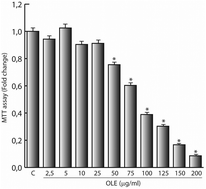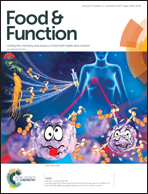Olive leaf extract counteracts cell proliferation and cyst growth in an in vitro model of autosomal dominant polycystic kidney disease
Abstract
Autosomal dominant polycystic kidney disease (ADPKD) is characterized by progressive enlargement of kidney cysts, leading to chronic kidney disease. Since the available treatment for ADPKD is limited, there is emerging interest for natural compounds as potential therapeutic candidates. The aim of our study was to investigate whether an olive leaf extract may be able to counteract the cyst growth in an in vitro model of ADPKD. We treated WT9-12 cells with an olive leaf extract (OLE). In monolayer culture we evaluated cell viability by the MTT assay, protein expression by western-blot analysis and apoptosis by DNA laddering and TUNEL assays. For functional studies we used transient transfection and ChIP assays. Intracellular calcium measurement was performed with a spectrofluorimeter using a fluorescent probe. 3D-cell-culture was used for cyst growth studies. OLE reduced the WT9-12 cell growth rate and affected intracellular signaling due to high c-AMP levels, as OLE reduced PKA levels, enhanced p-AKT, restored B-Raf-inactivation and down-regulated p-ERK. We elucidated the molecular mechanism by which OLE, via Sp1, transactivates the p21WAF1/Cip1 promoter, whose levels are down-regulated by mutated PKD1. We demonstrated that p-AKT up-regulation also played a crucial role in the OLE-induced anti-apoptotic effect and that OLE ameliorated intracellular calcium levels, the primary cause of ADPKD. Finally, using a 3D-cell-culture model we observed that OLE reduced the cyst size. Therefore, multifaceted OLE may be considered a new therapeutic approach for ADPKD treatment.



 Please wait while we load your content...
Please wait while we load your content...